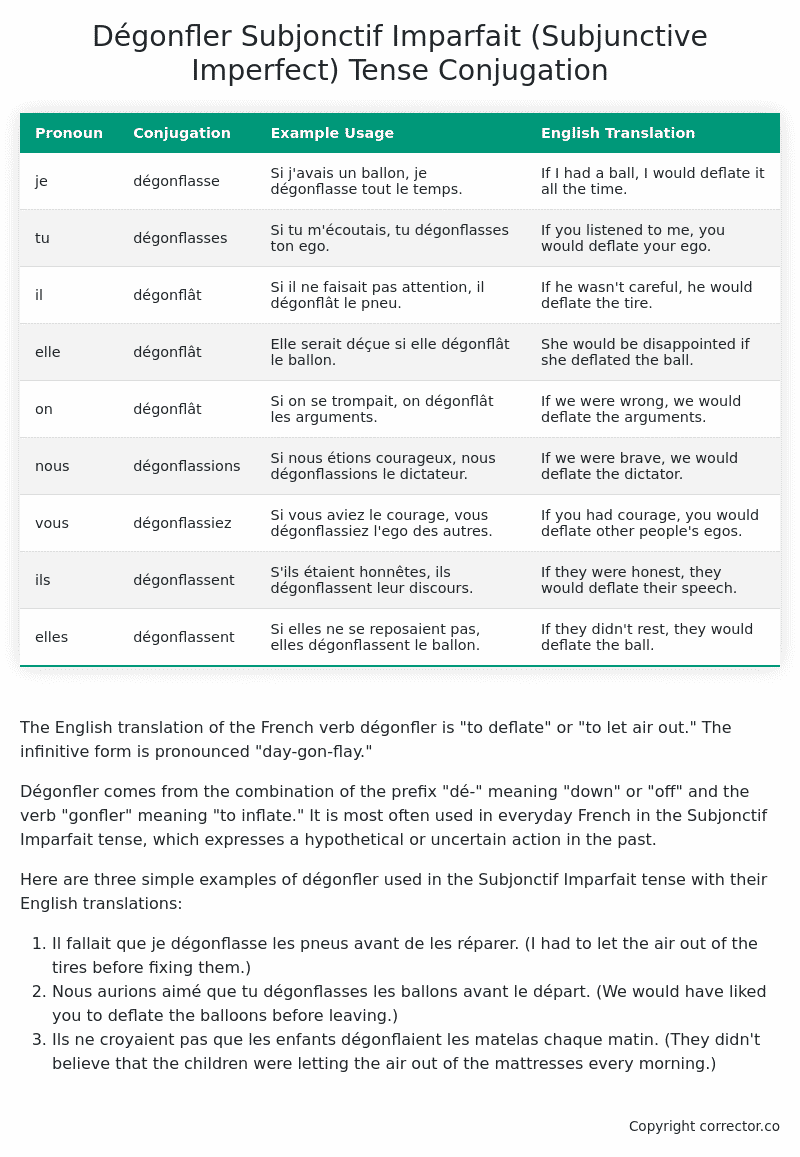Subjonctif Imparfait (Subjunctive Imperfect) Tense Conjugation of the French Verb dégonfler
Introduction to the verb dégonfler
The English translation of the French verb dégonfler is “to deflate” or “to let air out.” The infinitive form is pronounced “day-gon-flay.”
Dégonfler comes from the combination of the prefix “dé-” meaning “down” or “off” and the verb “gonfler” meaning “to inflate.” It is most often used in everyday French in the Subjonctif Imparfait tense, which expresses a hypothetical or uncertain action in the past.
Here are three simple examples of dégonfler used in the Subjonctif Imparfait tense with their English translations:
- Il fallait que je dégonflasse les pneus avant de les réparer. (I had to let the air out of the tires before fixing them.)
- Nous aurions aimé que tu dégonflasses les ballons avant le départ. (We would have liked you to deflate the balloons before leaving.)
- Ils ne croyaient pas que les enfants dégonflaient les matelas chaque matin. (They didn’t believe that the children were letting the air out of the mattresses every morning.)
Table of the Subjonctif Imparfait (Subjunctive Imperfect) Tense Conjugation of dégonfler
| Pronoun | Conjugation | Example Usage | English Translation |
|---|---|---|---|
| je | dégonflasse | Si j’avais un ballon, je dégonflasse tout le temps. | If I had a ball, I would deflate it all the time. |
| tu | dégonflasses | Si tu m’écoutais, tu dégonflasses ton ego. | If you listened to me, you would deflate your ego. |
| il | dégonflât | Si il ne faisait pas attention, il dégonflât le pneu. | If he wasn’t careful, he would deflate the tire. |
| elle | dégonflât | Elle serait déçue si elle dégonflât le ballon. | She would be disappointed if she deflated the ball. |
| on | dégonflât | Si on se trompait, on dégonflât les arguments. | If we were wrong, we would deflate the arguments. |
| nous | dégonflassions | Si nous étions courageux, nous dégonflassions le dictateur. | If we were brave, we would deflate the dictator. |
| vous | dégonflassiez | Si vous aviez le courage, vous dégonflassiez l’ego des autres. | If you had courage, you would deflate other people’s egos. |
| ils | dégonflassent | S’ils étaient honnêtes, ils dégonflassent leur discours. | If they were honest, they would deflate their speech. |
| elles | dégonflassent | Si elles ne se reposaient pas, elles dégonflassent le ballon. | If they didn’t rest, they would deflate the ball. |
Other Conjugations for Dégonfler.
Le Present (Present Tense) Conjugation of the French Verb dégonfler
Imparfait (Imperfect) Tense Conjugation of the French Verb dégonfler
Passé Simple (Simple Past) Tense Conjugation of the French Verb dégonfler
Passé Composé (Present Perfect) Tense Conjugation of the French Verb dégonfler
Futur Simple (Simple Future) Tense Conjugation of the French Verb dégonfler
Futur Proche (Near Future) Tense Conjugation of the French Verb dégonfler
Plus-que-parfait (Pluperfect) Tense Conjugation of the French Verb dégonfler
Passé Antérieur (Past Anterior) Tense Conjugation of the French Verb dégonfler
Futur Antérieur (Future Anterior) Tense Conjugation of the French Verb dégonfler
Subjonctif Présent (Subjunctive Present) Tense Conjugation of the French Verb dégonfler
Subjonctif Passé (Subjunctive Past) Tense Conjugation of the French Verb dégonfler
Subjonctif Imparfait (Subjunctive Imperfect) Tense Conjugation of the French Verb dégonfler (this article)
Subjonctif Plus-que-parfait (Subjunctive Pluperfect) Tense Conjugation of the French Verb dégonfler
Conditionnel Présent (Conditional Present) Tense Conjugation of the French Verb dégonfler
Conditionnel Passé (Conditional Past) Tense Conjugation of the French Verb dégonfler
L’impératif Présent (Imperative Present) Tense Conjugation of the French Verb dégonfler
L’infinitif Présent (Infinitive Present) Tense Conjugation of the French Verb dégonfler
Struggling with French verbs or the language in general? Why not use our free French Grammar Checker – no registration required!
Get a FREE Download Study Sheet of this Conjugation 🔥
Simply right click the image below, click “save image” and get your free reference for the dégonfler Subjonctif Imparfait tense conjugation!

Dégonfler – About the French Subjonctif Imparfait (Subjunctive Imperfect) Tense
Formation
Common Everyday Usage Patterns
Interactions with Other Tenses
Subjonctif Présent
Indicatif Passé Composé
Conditional
Conditional Perfect
Summary
I hope you enjoyed this article on the verb dégonfler. Still in a learning mood? Check out another TOTALLY random French verb conjugation!


